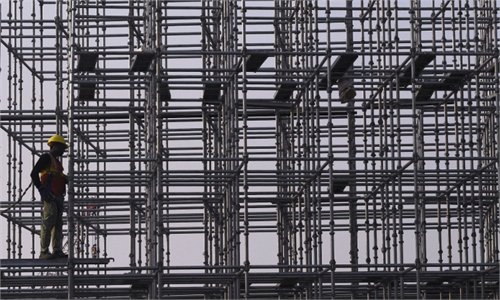
Illustration: Xia Qing/Global Times
India's cumulative trade deficit with China has exceeded $1 trillion since bilateral commerce began to boom in the early 2000s, and the trade gap has particularly widened in the past decade, India media outlet The Hindu reported on Wednesday. "An imbalance over an extended period of time poses problems," an Indian expert said.It's not entirely clear whether these estimates are accurate, but it is an indisputable fact that India's trade deficit with China has been widening, which has become a sensitive topic in India. India's trade deficit with China expanded to $69.4 billion in 2021 from $45.9 billion in 2020, according to China's customs data.
However, it should be pointed out that the deficit with China isn't a unique problem for India. The country's overall trade has been running at a deficit for decades, and the gap hit a new high of $30 billion in July.
Many Indian politicians and experts argue that in order to protect domestic industries and companies, the Indian government should take measures against Chinese companies, as they have been earning money from the Indian market. For instance, even as Chinese companies like Xiaomi have made great contributions in India, their businesses have suffered crackdowns and discriminatory treatment there.
New Delhi should see clearly that this hostile sentiment against Chinese companies in India is hurting rather than benefiting India's market and economy. Indian policymakers should realize that protectionist measures and restrictions against Chinese enterprises cannot resolve the structural problems of the Indian economy, let alone revitalize India's manufacturing sector and boost exports.
India has announced ambitious development plans for its manufacturing industry and brands, with some even claiming that India could replace China as the global manufacturing hub. However, protectionism is never the way forward for India or any country that seeks healthy long-term development. In order to promote its development, India should integrate into the Asian industrial chain, not the other way around.
India's trade deficit with China is only one aspect of the mutually beneficial bilateral trade relationship, which has broad space and prospects for development. In 2021, bilateral trade broke through $100 billion for the first time. Bilateral trade reached $91.2 billion in the first eight months of this year, and another full-year high is expected. Bilateral trade was only $2.9 billion in 2000.
The two countries have high trade complementarity. Indian manufacturing companies need to import lots of equipment, technology and components. Even foreign companies investing in India can't do without the support of China's industrial chain. The trade boom between China and India since the early 2000s was largely driven by India's imports of Chinese machinery and other equipment, according to The Hindu.
But such a mutually beneficial trade relationship is depicted by some Indian media outlets as India having a "reliance on trade with China." Distorted by a geopolitical lens, they call on the Indian government to take steps to reduce imports from China, including seeking other import sources.
This wrong trend has obviously affected India's policies on Chinese companies. India banned more than 200 Chinese apps and excluded Chinese companies from its 5G layout. Indian tax authorities have repeatedly launched so-called investigations into Chinese companies operating in the market. In the technology and telecommunications sector, Chinese tech giants' investments in Indian start-ups, which had grown rapidly, are now taking a huge hit.
Many Chinese companies have repeatedly expressed their willingness to expand investment and production in India. India should take concrete efforts to improve its business climate and provide assistance rather than obstacles for companies from China and other countries to deploy production lines in the country. Promoting Indian businesses' and industries' integration into Asian industrial chains is the right and healthy way for India to solve structural problems in its economy and trade.
China has never objected to India boosting its manufacturing sector, and it is willing to see India carry out mutually beneficial cooperation with other countries. Yet, it is impossible for any country, including India, to close up and develop its own industrial sector.
It's also important to point out that India will never succeed in boosting manufacturing and exports by pinning hopes on countries that only want to use India to contain China in their geopolitical calculations.
The author is a reporter with the Global Times. bizopinion@globaltimes.com.cn



